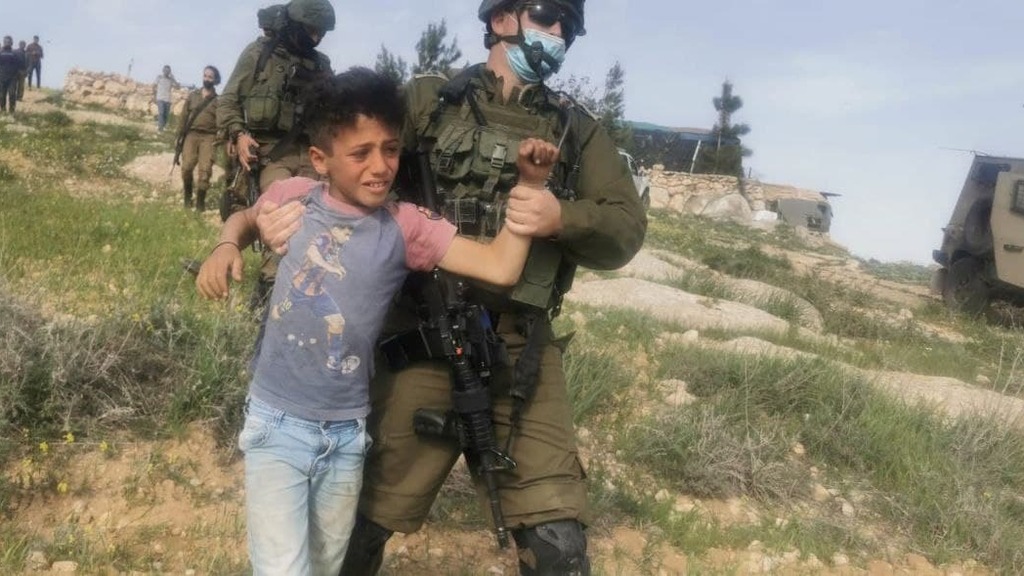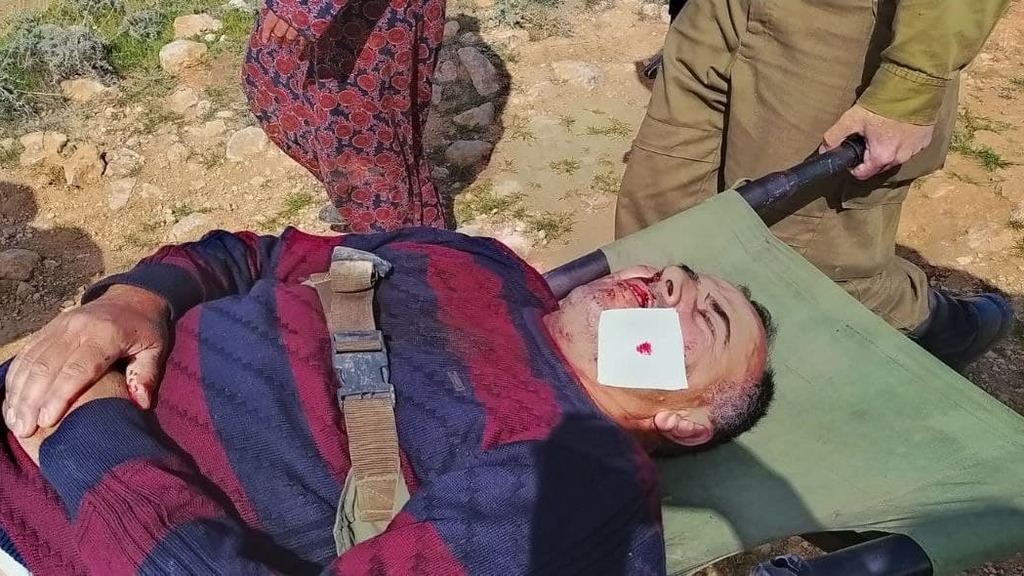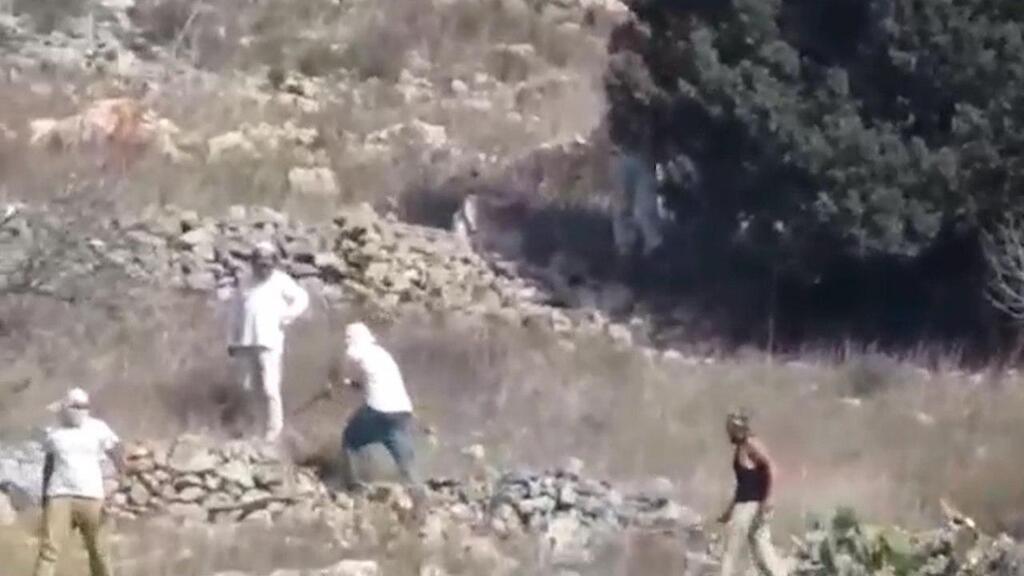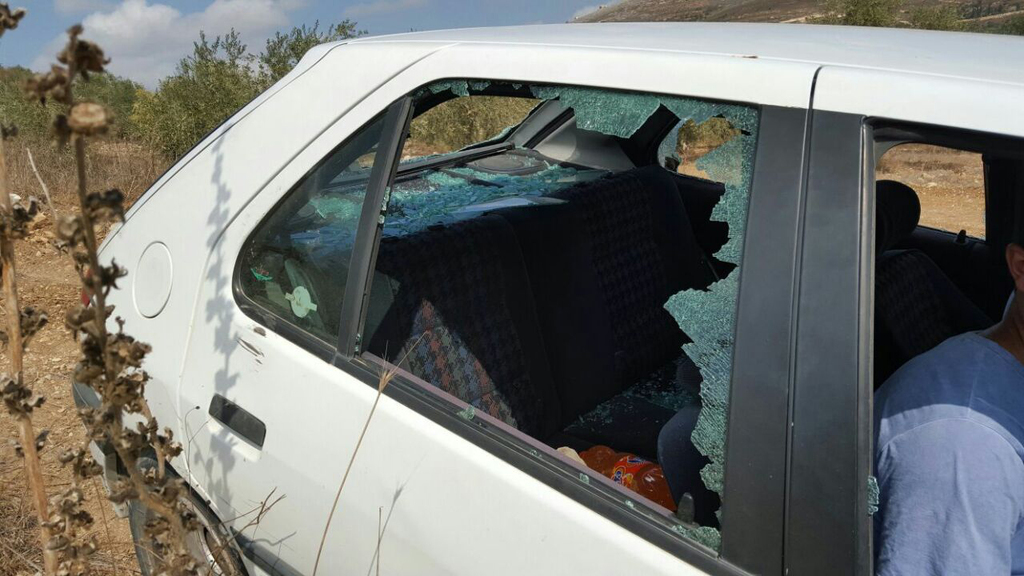Thanks to two recent incidents in the southern West Bank, the glaring disparity between settlers and Palestinians when it comes to Israeli law enforcement has again briefly captured public attention.
Five Palestinian children, ranging in age from 9 to 13, dared go near some homes in the settlement outpost of Havat Ma’on while picking the edible plant Gundelia (‘aqub).
4 View gallery


A Palestinian child arrested by IDF forces near the West Bank settlement of Havat Ma'on earlier this month
(Photo: B'Tselem)
A military force including at least two commanders ranking major quickly whisked them away to the police station in the settlement of Kiryat Arba.
Three days later, about 10 masked settlers assaulted a Palestinian family with clubs and stones near the settlement outpost of Mitzpe Yair, severely injuring the father, Sa’id ‘Alayan, in the jaw.
Unsurprisingly – given past experience – they have so far evaded arrest and punishment.
4 View gallery


Sa’id ‘Alayan was wounded in an attack by settlers near the West Bank settlement of Givat Yair earlier this month
Meanwhile, Prime Minister Benjamin Netanyahu’s election campaign found him visiting the nearby settlement of Susiya.
This conjunction highlights, yet again, the symbiosis between settler attacks and state violence throughout the rural West Bank.
Israel is hounding shepherding and farming communities that are among the most underprivileged groups in Palestinian society, in an attempt to drive them out of their homes.
Ze’ev Hever, one of the architects of the settlement enterprise and the head of Amana, recently described the organization’s modus operandi: establishing settlement outposts known as “agricultural farms” whose reach extends far beyond their built-up area as their flocks needs vast pastureland.
According to Hever, “building doesn’t take up a lot of space, for financial reasons. It took us more than 50 years to get to 100 square kilometers.”
Livestock farms, on the other hand, “control more than double the land area of built-up communities… one farm can protect several square kilometers of land.”
What does “protecting” land mean? Unlike Hever’s bucolic description, the young settlers in these outposts employ a regime of violence and intimidation against Palestinians who live nearby or used to graze their flocks in the area, all with full state backing.
Hever is right, however, that the impact of these small settlements extends far beyond their built-up areas, a mission to which their residents devote considerable effort. They patrol extensive areas far from the farms, assaulting Palestinian shepherds or farmers and driving them out.
In the case of the ‘Alayan family, the victims are Palestinians who had come for a weekend picnic on their own land.
Many Palestinians have simply given up filing complaints about these attacks, having learned from experience that the Israeli law enforcement system offers them no protection.
4 View gallery


Settlers hurl stones at Palestinians near the West Bank village of Burin in 2019
(Photo: Yesh Din)
As revealed in a recent report by Kerem Navot and B’Tselem, some 40 such “agricultural farms” have been established in the West Bank over the last decade.
The fact that they are illegal even by Israeli definition (while all settlements are illegal under international law) raises few eyebrows. It is common knowledge that these supposedly pirate ventures are in fact backed by the state.
This is Hever’s “protection” of land: a strategic, systematic campaign of violence to drive Palestinians out of more and more parts of the West Bank, in order to pave the way for a state takeover and the construction and expansion of “official” settlements.
4 View gallery


A Palestinian farmer's car is vandalized during a 2020 attack on olive farmers by Yitzhar settlers
(Photo: Zakaria Sada)
The establishment of these “farms” and the state-backed violence of their residents are integral to Israel’s policy, which bars any Palestinian development in the West Bank.
As part of this policy, Israel has launched a large-scale demolition campaign against Palestinian shepherding communities such as Khirbet Humsah, which has been demolished six times to date.
This is the full picture: the State of Israel encourages, with both direct and indirect funding and by refraining from law enforcement, settlers’ actions to drive Palestinians out of the rural parts of the West Bank.
All in the name of the apartheid regime that Israel employs throughout the entire area under its control, from the Jordan River to the Mediterranean Sea.
Those who carry it out sometimes wear military uniforms, sometimes drive bulldozers, and sometimes are external contractors – violent militias disguised as shepherds.
Sarit Michaeli is the International Advocacy Officer for the B’Tselem human rights NGO

